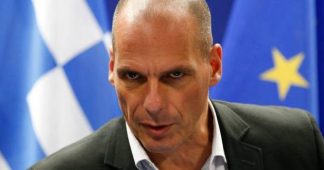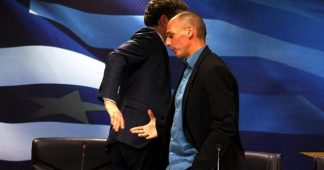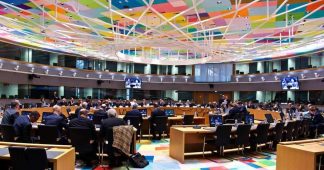By Dimitris Konstantakopoulos
March 17, 2020
In a previous article we argued that the Greek “bailout” program, the Loan Agreements and the “memorandum of understanding” imposed on Greece were a crime against the Greek people, a crime which paved the way for similar crimes against other European nations, against both their social and their democratic rights. We have sufficient evidence for all this as is, but two very important new documents have come to confirm what we wrote above and permit us to take a direct look at how Greece and its elected government were destroyed by Germany and the EU in 2015. Those two documents are not important only to understand what happened with Greece in 2015, they also give us important insights into how the new, totalitarian and completely uncontrolled power of finance is structured and how it is functioning.
The first of those documents is the film by Costa Gavras “Adults in the Room.” The President of the Cinémathèque Française, Gavras has made amazing films in the past in which he presented the crimes of US Imperialism (in Chile and Greece) and of Soviet Stalinism (the framed trials of the leaders of the Czechoslovak Communist Party), crimes which characterized the Cold War and the 20th century. With his new film, Gavras highlights the central phenomenon of the 21st century, that is the rise of the new totalitarian power of finance, a power which poses a direct threat to human civilization and to the very survival of mankind.
The film allows us to be present, to follow the deliberations of one of the most important, but also of the most secretive European institutions, of the “informal” Eurogroup, the council of the Finance Ministers of the Eurozone. By following those meetings, especially in a time of crisis, we can fully grasp the role and the importance of Eurogroup in the new totalitarian order. Any Greek, any European and any citizen of the world, who wants to understand the world in which he lives must watch Gavras’s film (even if the film has also, in our opinion, a serious flaw, about which we will talk later).
We also suggest to our readers, after seeing the film, to read or re-read Franz Kafka’ masterpiece The Trial, one of the most significant books of the 20th century. If they read it, they will undoubtedly see the eerie resemblance between the Eurogroup, the real “financial government” of the Europe the Bankers have designed and the court Kafka had just imagined. Gavras’ film is based on the recordings of the Eurogroup meetings made by Greek Finance Minister Yianis Varoufakis. The Greek politician promised to release all these recordings on March 10. These are the second document critical to understanding the role of the Eurogroup in Greece’s “execution.”
We think that an international commission should be set up by intellectuals of recognized prestige and honesty, such as for example the Swiss writer and former UN Commissioner Jean Ziegler or the American linguist Noam Chomsky, to examine the deliberations of the Eurogroup and to make a conclusion about the Greek question and how it was handled.
No laws, no rules
Let us look now a little bit more in detail on the role of the Eurogroup based on Gavra’s film and explain why we compared it with Kafka’s Court. In fact, the Court is perhaps more liberal than the Eurogroup! The Eurogroup, like the Court, belongs to the Kingdom of the Arbitrary. Nobody knows who really makes the decisions nor what the rationale behind them is. Decisions are not explained or justified, they are made before the meetings and imposed during them. The whole job of the Eurogroup is to ratify them by issuing a statement. In one or two cases when Varoufakis comes to some agreement with Moscovici, he finds out that his agreements are of no value. There is a superior and invisible “authority” that can abolish them. The Greek Finance Minister is not even allowed to submit his own proposals!
The Eurogroup is informal, that is, it does not have a specific, well-known and defined mode of operation, nor is it subject to any known rules. All deliberations are verbal, there are no written minutes kept, the only document is the communique containing the decisions of the group, without even an explanation of them. In practice, we have already returned to a regime of constitutional monarchy in Europe, with one important difference. In the Middle Ages everybody knew who the King was, whereas nowadays the Emperor, for the first time in history, is hidden.
Read more at https://uwidata.com/8851-goldman-sachs-and-eurogroup-2015-kafka-in-the-room/











